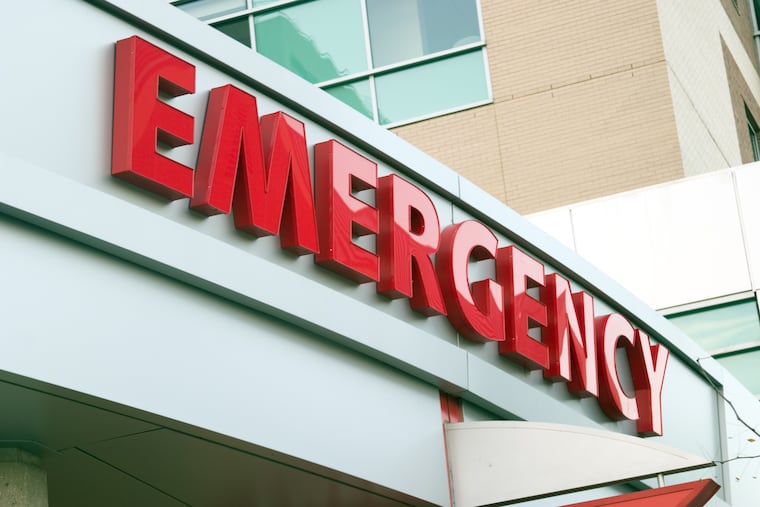Pennsylvanians deserve better mental health care than just the emergency department safety net | Opinion
I applaud the Pennsylvania Joint State Government Commission for its recent report on behavioral care in emergency departments, but the whole system needs fixing.

COVID-19 has brought greater attention to medicine’s front line. Emergency departments (EDs) are often where disparities in the health-care system surface — including unique barriers for psychiatric patients.
The state of Pennsylvania has recognized this issue, tasking the Joint State Government Commission to review psychiatric care from EDs. Their report, released July 30, recognizes the “current mental health and substance use disorder system in Pennsylvania is underfunded, and in many areas, fragmented, to the detriment of the mental and physical health” of those who need its services.
The commission’s recommendations are a good start: creating a centralized database of available beds, capitalizing on telehealth, and reinforcing the need for parity by insurance carriers will help make the system more equitable and up-to-date. However, they do not prescribe greater transparency or accountability for psychiatric treatment facilities, including standardizing criteria for accepting patients and decreasing variability between Pennsylvania counties. Until those issues are fixed, people in need of mental and behavioral health care will continue to experience disparate treatment.
Despite the challenges we see in our hospitals, Philadelphia has several resources for psychiatric patients, including a system of crisis response centers (CRCs) specializing in psychiatric emergencies and care. But Pennsylvania’s suburban and rural counties lack CRCs, and community hospitals often lack inpatient psychiatric units. That makes it all the more likely that navigating the complexity of behavioral health will fall to the ED team — nurses, case managers, and doctors whose time and attention must be split between all immediate patient care needs.
As with others, these patients are brought to emergency departments in extreme need and when there may be nowhere else to go. While EDs stand ready to receive anyone who comes to our doors, there remain sharp contrasts between patients presenting for other health emergencies and those suffering mental health crises.
The commission’s report describes the limited mental health workforce across Pennsylvania. EDs know this well — while we have access to most other medical specialties for the sake of our patients, this is often not the case for psychiatry. Patients with the most severe mental illness or needs must be transferred out of the ED to another facility, which can take many hours to days.
The process itself of transferring psychiatric patients is archaic. The health-care system meets critical medical needs — such as gunshots, severe burns, stroke, heart attacks — with efficient communication and coordination for resource allocation, bed assignments, and transportation, knowing any delay could harm patients. Yet, psychiatric transfers depend on time-consuming individual phone calls and faxes back and forth.
“We would not let someone with a physical ailment languish for days.”
Meanwhile, the patient — whether suffering from untreated schizophrenia and paranoid delusions, severe depression with suicidal thoughts, or a suicide attempt — must remain in the ED, barraged by loud noises and constant activity, with limited personal freedoms due to concern for their well-being. While there may be no outward signs — no blood loss, abnormal tests, open wounds — all of us in the ED recognize these patients’ pain, suffering, and trauma, yet are powerless to help beyond our realm. We would not let someone with a physical ailment languish for days.
More so than in the broader health arena, those suffering from mental health issues face significant care variability from their specialized providers, due to factors such as the patients’ acuity, languages they speak, and behavior. Providers with highly coveted psychiatric inpatient slots essentially get to “pick” their ideal patients. Disparities abound, and patients often seem to be punished for the nature of their illness. They can spend days in the ED waiting for a willing provider to become available.
The state commission’s report recognizes that the organization of behavioral care is complex, with several large agencies reporting to different governmental structures. But it doesn’t describe the barriers that county-level organization can pose. As EDs serve patients no matter from where they arrive, being bound by county-specific processes based on their residence is a unique barrier to care, only affecting the sickest people requiring an involuntary commitment for their safety.
» READ MORE: New Jersey’s 2021 budget should expand mental health treatment | Opinion
I applaud the General Assembly of Pennsylvania for recognizing the many issues faced by those with behavioral health emergencies seeking care in EDs, and the collaborative, multidisciplinary efforts of the Joint State Commission and Advisory Board to address them. With timely implementation and follow-through, these recommendations can greatly improve access to necessary care and decrease the disparities experienced by those with mental health emergencies.
Still, Pennsylvania’s behavioral health systems also need modernization, greater transparency, communication, and equity across the state. Patients experiencing acute distress in EDs should be recognized for their high level of need and risk of worse outcomes with any delay to care — as has already happened for other medical emergencies. Agencies providing mental health services should have a clear, standardized process to fill their slots and be held accountable.
Mental and behavioral health has long been stigmatized — including in medicine. It is particularly disappointing to see underlying stigma in the very systems organized to help patients in times of desperate need. Parity of care should exist even outside the ED.
Priya Mammen is an emergency physician, a fellow of the Lindy Institute of Urban Innovation at Drexel University, and an adjunct faculty at the University of Pennsylvania.